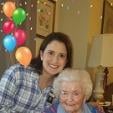-
Posts
10,149 -
Joined
-
Last visited
Content Type
Profiles
Forums
Articles
Everything posted by Ormond
-
Below is the column as I wrote it. There were a few minor differences in how it was published after editing.
Wendy
Wendy has her own story now.
“Wendy”, the long-anticipated second feature from Oscar-nominated director Benh Zeitlin, opened nationwide February 28. It reimagines “Peter Pan” with Wendy (Devin France) as a resourceful heroine who saves her world from disaster. “Wendy” comes to Omaha’s Dundee Theater March 13.
“Peter Pan” began as a 1904 play by Scottish author J. M. Barrie (1860-1937). He named Wendy in honor of Margaret Henley (1888-1894). Daughter of poet William Ernest Henley, Margaret died of meningitis at age five. She called Barrie “Fwendy-wendy”, inspiring Wendy Darling’s name.
Many names (including Vanessa, Pamela, and Dorian) are author creations, and “friend” is a great meaning. Still, many commentators seem embarrassed by Wendy’s baby-talk origin and insist it’s a form of Gwendoline. There really isn’t good evidence Wendy was used as a pet form of Gwendoline before Barrie’s play.
Wendy is an English place name and surname. Wendy’s a hamlet in Cambridgeshire, meaning “island at a river bend” in Old English.
A local family took its surname from the village. Thomas Wendy (1500-1560) was a physician to King Henry VIII and member of Parliament. Over the next four centuries a few boys were named Wendy after the family. There’s no clue Barrie knew that when he created Wendy Darling.
Barrie’s play was such a hit in London a New York production starring Maude Adams premiered in 1905. Soon real Wendys were born on both sides of the Atlantic.
The name stayed rare in the United States until Barrie’s own goddaughter Marguerite Wendy Jenkins (1912-1978) took up acting and made Wendy Barrie her stage name.
Wendy Barrie’s first American film was 1935’s “It’s a Small World” opposite Spencer Tracy. In 1936, Wendy first ranked among the top thousand names. Wendy took a big jump when “The Wendy Barrie Show”, one of television’s first talk shows, aired between 1948 and 1950. In 1951 the name ranked 109th.
Walt Disney’s animated “Peter Pan” premiered in 1953, and the famous Broadway musical starring Mary Martin debuted in 1954. In 1958 English actress Wendy Hiller won a Best Supporting Actress Oscar for “Separate Tables”.
The Beach Boys’ 1964 song “Wendy” jumped the name to 39th. A final push came from The Association’s 1967 hit “Windy.” Though its lyrics “stormy eyes that flash at the sound of lies” are about personified weather, many interpreted it as “Wendy”, helping the name peak at 28th in 1970.
Today’s most famous Wendy is probably “Wendy” Thomas (born 1961) whose father Dave named hamburger chain Wendy’s after her in 1969. Befitting a name created from baby talk, Wendy’s a nickname from her childhood mispronunciation of Melinda.
Other American Wendys include photographer Ewald (1951), winner of a 1992 Macarthur Fellowship; talk show host Williams (1964), Pulitzer Prize winning playwright Wasserstein (1950-2006), astronaut Lawrence (1959), and Prince protégé guitarist Melvoin (1964). ESPN anchor Wendi Nix (1974) and actress Wendie Malick (1950) (Nina in “Just Shoot Me!” and Victoria in “Hot in Cleveland”) make alternative spellings well-known.
Money launderer’s wife Wendy Byrde (Laura Linney) in “Ozark” and psychiatrist Wendy Rhoades (Maggie Siff) on “Billions” are newly famous fictional Wendys.
The typical Wendy turns 50 this year, and the name fell to 969th in 2018, lowest since 1935. Still, most Americans will have a friendy Wendy for a while yet.



